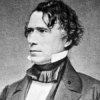Franklin Pierce

Franklin Pierce
Franklin Piercewas the 14th President of the United States. Pierce was a northern Democrat who saw the abolitionist movement as a fundamental threat to the unity of the nation. His polarizing actions in championing and signing the Kansas–Nebraska Act and enforcing the Fugitive Slave Act failed to stem intersectional conflict, setting the stage for Southern secession...
NationalityAmerican
ProfessionUS President
Date of Birth23 November 1804
CityHillsborough, NH
CountryUnited States of America
With the Union my best and dearest earthly hopes are entwined.
Defense was the name of the game, ... This is a big win for the program a huge win. We were knocking on the door last year and we thought we could get it going this year.
You have summoned me in my weakness. You must sustain me in your strength.
There's nothing left . . . but to get drunk.
After the White House what is there to do but drink?
In expressing briefly my views upon an important subject which has recently agitated the nation..., I fervently hope that the question is at rest and that no sectional or ambitious or fanatical excitement may again threaten the durability of our institutions.
The revenue of the country, levied almost insensibly to the taxpayer, goes on from year to year, increasing beyond either the interests or the prospective wants of the Government.
In a body [like Congress] where there are more than one hundred talking lawyers, you can make no calculation upon the termination of any debate.
READILY and, I trust, feelingly acknowledge the duty incumbent on us all . . . to provide for those who, in the mysterious order of Providence, are subject to want and to disease of body or mind; but I cannot find any authority in the Constitution for making the Federal Government the great almoner of public charity throughout the United States . . . .
A Republic without parties is a complete anomaly. The histories of all popular governments show absurd is the idea of their attempting to exist without parties.
I find the remark, "Tis distance lends enchantment to the view" is no less true of the political than of the natural world.
Frequently the more trifling the subject, the more animated and protracted the discussion.
I speak of the war as fruitless; for it is clear that, prosecuted upon the basis of the proclamations of September 22d and September 24th, 1862, prosecuted, as I must understand these proclamations, to say nothing of the kindred blood which has followed, upon the theory of emancipation, devastation, subjugation, it cannot fail to be fruitless in every thing except the harvest of woe which it is ripening for what was once the peerless republic.
The founders of the Republic dealt with things as they were presented to them, in a spirit of self sacrificing Patriotism and as time has proved, with a comprehensive wisdom which it will always be safe for us to consult